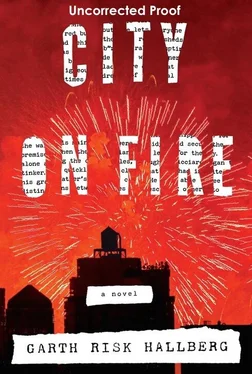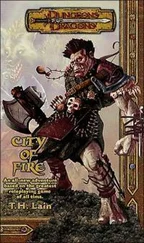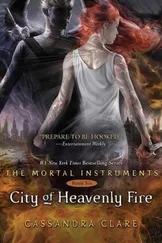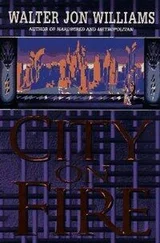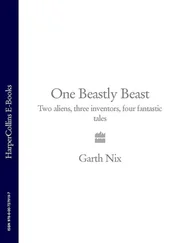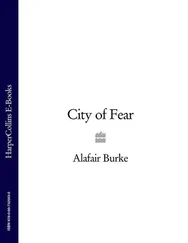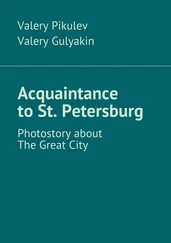[POSTSCRIPT]
THIS CITY, WHICH NOT TO LOOK UPON WOULD BE LIKE DEATH
Nothing dies; all is transformed.
— BALZAC, Pensées, sujets, fragments
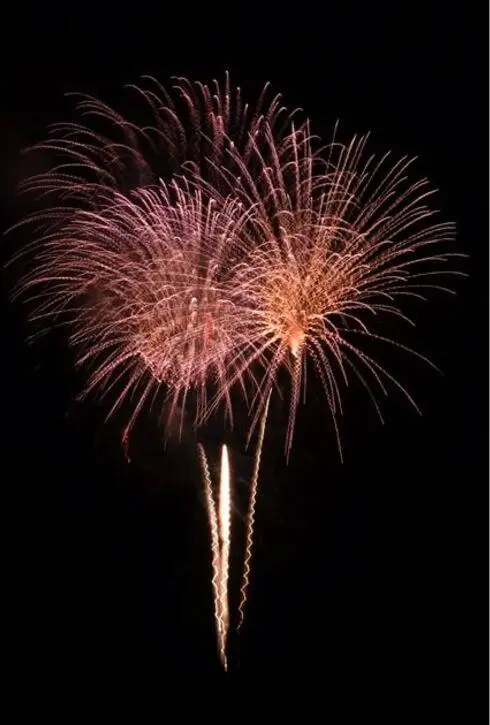
TO: reganlamplighter@hotmail.com
SUBJECT: Re: Disposition of Estate/Evidence III
8/27/03, 4:52 a.m.
ATTACHMENT: TCWNTLUWBLD.doc
First, Mom, let me say I owe you an apology, not least for the lateness in replying to your email of 7/14. If it helps, you were right about almost everything, including how much longer all this would take than I estimated. I seem to need to believe a piece of work will be easier than it is in order to begin it. Which is at least doubly true here, in that we’re talking about more than one kind of work. These last weeks, I’ve been at the laptop all day and half the night just to get my notebooks typed up. The good news, though, is that as of the close of this email, it’s done, I think. And I finally settled on a way of presenting the third part of the triptych that feels true to what Uncle William was after. Augenblick introduced me to a computer programmer he knows up in Murray Hill. Now there’s a little piece of software logging every keystroke. Including these.
You’ll notice that all traces of the U.S.S.R. not collapsing in ’89 and John Travolta becoming leader of the free world have been weeded out of the attached document; you were right about that, too, and I’m sorry for blowing up at you for reacting as you did to that first, more fantastical schema. I was in a bad way at the time. I felt like your resistance on principle to posthumous exhibitions was overriding your ability to see what I needed. In my defense, artistically speaking, I think I really was trying to demonstrate the possibility of things being other than they are. But of course what I’ve learned is that you can’t prove most of the things that matter; it seems to be a violation of the rules, which require you rather to dream. Besides, the nature of life on earth is so breathtakingly unschematic. It ended up being both cleaner and more honest, somehow, to leave open the whole question of ontology, preserve some freedom of play. I mean, you and I both know that all this really happened — I’ve got the documentation here — but I’ve found that even in a courtroom, documents are increasingly unlikely to persuade the unpersuadable. And thinking about issues of legal indemnity, not to mention the larger implications, maybe it’s better to leave room for people who still need to imagine “Evidence III” as some sort of fairy tale. Certainly, for me, it’s been that, among other things: a path to somewhere other than the awful place I was last winter.
I’m aware that I’m falling back into it even now, the habit you pointed out to me. Cleverness as a defense mechanism. “Intellectualizing.” Or should I say temporizing? The bald fact I’m avoiding writing about is that after our long summer apart, Julia is due in tomorrow night, which is now tonight. (You can see from the timestamp above how well I’m sleeping, but I’m happy to report no bad dreams.) And when I think of her plane touching down, her voice, the fact that maybe since we last spoke she’s changed her mind about being willing to do whatever it takes — to surrender me for three months to this mitzvah — I get nervous. Though sometimes nervous can be good. I hope this is one of those times. The truth is, I missed her awfully, Mom. Miss her.
But anyway, as regards the first part of your email, the plan is: vitrines. Those plexiglass containers like in the D. Hearst (Hurst?) installation with the shark. Augenblick is having sixteen of them made to my specifications, long low things with frames of reclaimed wood. The “Evidence III” material will be distributed among them and sealed permanently inside — all those archives from ’77, the fanzines and Groskoph’s manuscripts and so on, but also Uncle William’s correspondence and interview transcripts from the fall of 2001, when he was getting back in touch with what his diary calls (with a level of sarcasm not ascertainable on the page) “the old gang.” In keeping with the idea of leaving room for other people’s New Yorks, you’ll be able to see in these vitrines the paper trail I followed here, though not all of it. They’ll line the front room of the gallery, the one you enter through.
In the other, larger room, the walls will remain big white blanks. In the center will be rows of chairs facing four ways, and likewise four projectors. The night of the opening, Augenblick will press “play” on his computer and the little piece of software I mentioned above will run like a player piano. Over the course of the next ten days, the walls will fill up with projected pages from this attachment, 220-odd sheets per wall, as though a ghost were writing. And then, at the midpoint of the exhibition, which is to say when the entire document has been “typed” onto the wall, the program starts to run backward, and over the final ten days, letter by letter, page by page, the whole thing disappears.
Augenblick’s arranged to keep the gallery open day and night during that time: people can come and go at all hours. Afterward, I guess he’ll sell the vitrines, assuming the Feds don’t swoop in and impound them in Area 51 or wherever they bury the cases they just want to go away. Any proceeds, minus his commission, will be added to Uncle William’s estate, and thus pass to you. But I’ve already told Augenblick he can’t have my end of the piece, attached here. (Into which, hoping you don’t mind, I will also paste this email as a postscript.) As of September 30, your inbox will hold the sole copy. What happens after that I leave to your executorial judgment. The important thing for me, I want to believe, is to put all the ghosts to rest. To feel like it is done.
As for our itinerary, Julia has us flying back to LAX the 12th, the day after opening night. I know she’s right. It’s time. In a way, though, as much as I’m feeling now an incredible and totally unexpected gratitude for the life I do have — and as much as I mean never again to let her go — I wish we could stay in New York for the full run of “Evidence III.” I find myself curious, especially, to see who fills the chairs. Mostly Augenblick’s black-jeaned disciples, probably, and a few members of the press. But, crazy as it is, I’m imagining Mercer Goodman might come, too. I only ever met him that one time at Thanksgiving, obviously, but found him amazingly understanding and helpful on the phone, and (though perhaps you already know this) he and his husband Rafe apparently flew over from Paris there at the end to help Uncle William with cooking and cleaning and getting down to the new park along the Hudson every so often to see the sunset. And I’ve invited the Pulaskis, for whom I insisted there be space for a wheelchair. And maybe Charlie Weisbarger got my email after all and will take a few days off from his work with juvenile offenders in Boston. I’d like to meet him in person. I’d like nothing better, Mom, than to have a chance to reintroduce you.
And this brings me to the most unexpected thing of all: the people whose faces I’d most like to see watching the thing unfold (not counting Julia’s) are yours and Dad’s. Maybe you sensed all along what the outcome of this summer would be — maybe it’s why you helped arrange for this apartment — but I find I’m not mad at either of you anymore. Can’t stop trying to think my way into you, in fact.
I find myself recalling, in particular, how the morning after the blackout, the two of you came back to Brooklyn Heights together. Do you remember? Cate was snoring on the new master bed, doing that cocooning she always did with the covers. I was stretched across the foot, pretending to sleep. The light was everywhere. Dad was the one who spotted on the windowsill the wine-bottle I’d half-emptied in the night (and which — let’s be honest — I probably left there to be found). Through slitted eyes, I saw him turn to you, swirling it around by the neck. And you were the one who shrugged. Please, Keith, let them just sleep. You were wearing my sneakers. You used to have this certain way of taking off your shoes, kicking up each leg behind you and reaching back. I watched you swap out the sweatshirt you’d been wearing for a white V-neck tee Dad seemed surprised to recognize was his own. And then you climbed into bed and folded yourself into the space between me and Cate and closed your eyes. I wonder now if you meant for him to feel tested. Stay or go? Either way, the knowledge of what he’d done was going to follow him. Either way, there would be constraint. It occurs to me that what adulthood actually is is the problem of what one wants to constrain oneself to.
Читать дальше
